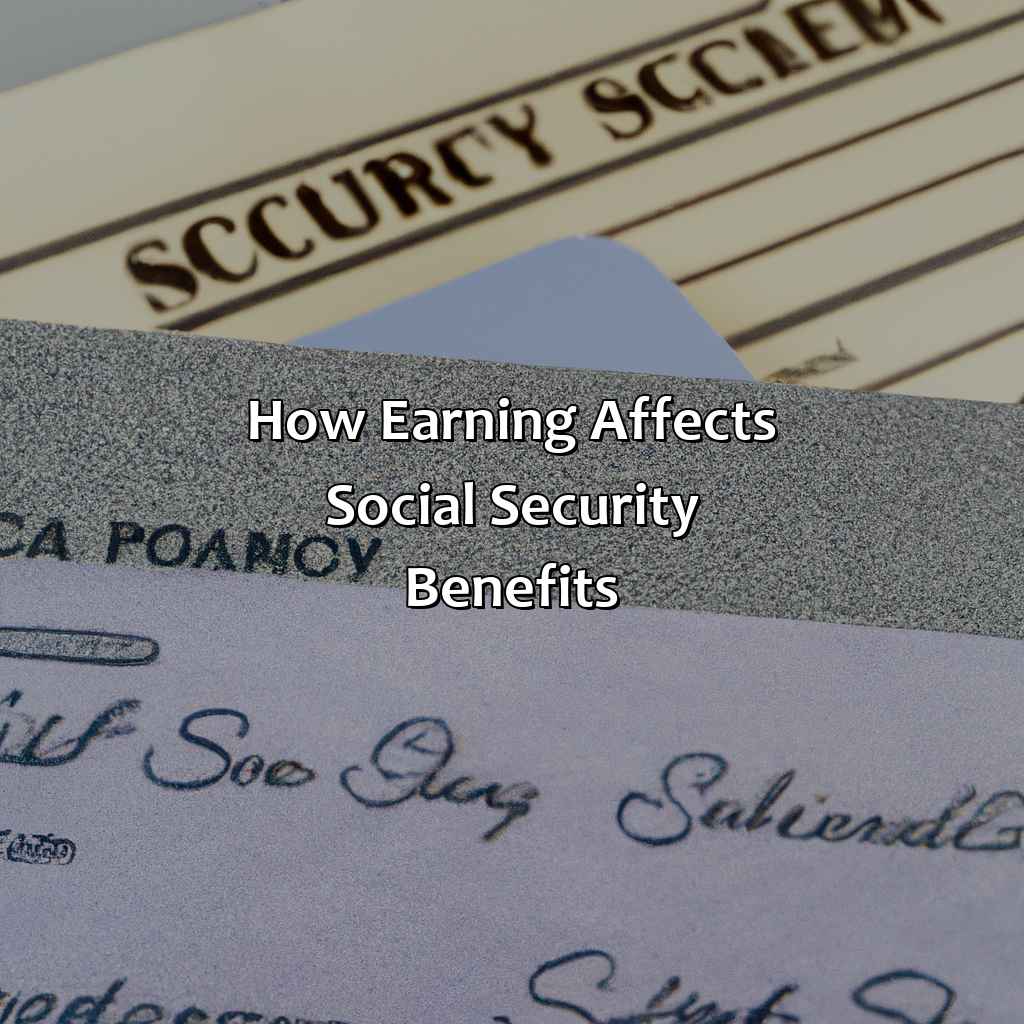How Work Affects Your Social Security Benefits?
Key Takeaways:
- Earning affects Social Security benefits: Individuals who continue to work while receiving Social Security benefits may face reduced benefits due to surpassing the earnings limit. It is important to understand the impact of earning on benefits to make informed decisions about working.
- Effect of delaying retirement: Delaying retirement and continuing to work after reaching full retirement age can result in increased benefits. Individuals can maximize their benefits by considering their retirement age and income strategies accordingly.
- Impact of early retirement: Retiring early can result in lower Social Security benefits due to a reduction of benefits determined by the number of years before reaching full retirement age. It is important to understand the impact of early retirement on benefits to make informed decisions.
Are you ageing and worried about how to balance your work and social security benefits? This article will help you make an informed decision about your retirement plan. You will learn how work affects your social security benefits and how to ensure a comfortable financial future.
How Earning Affects Social Security Benefits
Earning Impact on Social Security Entitlement
Working has a direct impact on social security benefits and it’s essential to understand how. Depending on the amount of income earned, your benefits could be reduced or withheld.
Moreover, if you’re below the full retirement age and earn over the yearly limit, your benefits will be affected. In such cases, for every $2 earned over the limit, $1 will be deducted from your benefits.
Furthermore, it’s vital to report all of your earnings as failure to do so could lead to overpayments and penalties. Keep in mind that social security benefits are not welfare programs, but rather insurance programs that require you to understand the rules and regulations.

Image credits: retiregenz.com by David Woodhock
Working while Receiving Social Security Benefits
Explore the section on “Working while Receiving Social Security Benefits”! We’ll focus on the sub-sections:
- “Effect of Earning Limit on Benefits”
- “Reduction of Benefits due to Earnings”
These will help us understand how much we can earn without affecting our benefits. Plus, how our benefits may reduce if we go over the earning limit.

Image credits: retiregenz.com by James Duncun
Effect of Earning Limit on Benefits
When receiving social security benefits, your earning limit may affect your payments. By earning over a certain amount, you could see a reduction or suspension of payments. This limit varies depending on your age and type of benefit received.
It is important to note that the earnings limit only applies to income from work, not other sources such as investments or pensions. Additionally, only earnings before full retirement age will be subject to the limit.
To calculate how much your benefits may be reduced, the Social Security Administration uses a formula that considers your monthly earnings and benefit amount. For every $2 earned over the limit, $1 will be deducted from your monthly benefits.
Pro Tip: Be sure to report any changes in income promptly to avoid overpayments and potential penalties.
Working hard to make a living? Prepare to work harder if you want to keep your social security benefits too.
Reduction of Benefits due to Earnings
When you receive Social Security benefits and continue to work, your earnings may impact the amount of benefits you receive. Consequently, your benefits may be reduced if you earn more than a certain threshold amount.
The reduction of benefits due to earnings is calculated by deducting $1 from your Social Security payments for every $2 earned over the annual limit. In 2020, this limit was set at $18,240 for those under full retirement age and $48,600 in the year they reach full retirement age. These limits are updated annually.
It’s important to note that only earned income counts towards these limits. Passive income, such as from investments or rental properties, does not affect your Social Security benefits. Additionally, if you continue working beyond full retirement age, there is no longer an earnings limit.
If you expect to earn more than the annual limit and want to avoid a reduction in benefits, it may be best to delay receiving Social Security payments until you reach full retirement age or later.
Don’t miss out on potential retirement income by not fully understanding how earning income while receiving Social Security benefits can affect your payments. Be aware of earned income limits and consider delaying payments if necessary. Who needs a midlife crisis when you can just retire early and enjoy those sweet social security benefits?
Early Retirement and Social Security Benefits
How does early retirement affect your social security benefits?
Solutions like the effect of retiring early on benefits, and strategies to maximize benefits while working, can be looked at. These sub-sections provide different ways to get the most out of your social security when retiring early. They give you the info needed to make smart decisions about your financial security in the future.

Image credits: retiregenz.com by Joel Duncun
Impact of Early Retirement on Benefits
Retiring early can impact social security benefits in various ways. These effects are often complex and interrelated, making it challenging to predict how any particular individual may be affected. The amount of one’s benefit may differ depending on their retirement age, work credits earned, and other factors that come into play. Simply put, if you retire at the earliest age of eligibility, you will receive lower Social Security benefits than if you wait until your full retirement age.
Furthermore, retiring early requires careful planning to determine how it will influence your ability to earn sufficient wage credits towards qualifying for retirement benefits. If a person retires too early or fails to keep sufficiently active by engaging in gainful employment even after retirement, they might find themselves having inadequate credits to qualify for Social Security disability and survivorship benefits.
On the brighter side of things, early retirement can sometimes increase the value of Social Security benefits when planned carefully. For example, continuing to work beyond age 62 while simultaneously taking retirement may give individuals time to channel more income into the system and delay receiving payments until later so that they receive a higher percentage when they start.
A report by AARP suggests that “Over 60 percent of retirees rely on Social Security as a significant source of income”, highlighting the urgency of considering the effect of early retirement before making such an important life decision.
Make money, get social security benefits, and retire early? Sounds too good to be true, but with these strategies, it just might work.
Strategies to Maximize Benefits While Working
To optimize Social Security benefits while still working, there are several tactics to consider. These involve adjusting your earnings, timing of filing for social security and other related aspects. Here is a 4-step guide to help maximize benefits:
- Determine how much you want to earn and the impact on Social Security benefits
- Understand the earnings test rules to determine how they may apply
- Timing is important – delay filing for Social Security as long as possible
- Utilize strategies like file and suspend or restricted application to further maximize benefits
It is important to note that factors like life expectancy and financial needs can also play a role in optimizing benefits. Keep these in mind when developing a plan.
When planning for retirement, you should also consider the effect on Medicare. Medicare premiums change depending on income which can significantly impact retirement budgets.
Research from Investopedia suggests that “In general, nearly half of married couples rely on Social Security for at least 50% of their income in retirement.”
It’s essential to have a well-structured plan increase future financial security by utilizing their Social Security benefits while still experiencing job satisfaction during his/her professional run until retirement.
Retirement age may be full, but Social Security benefits are half empty without proper planning.
Full Retirement Age and Social Security Benefits
Understand Full Retirement Age and its effect on Social Security Benefits better. See the advantages of delaying retirement. Learn how delaying can increase your benefits and working beyond Full Retirement Age impacts your Social Security payments. Get the facts!

Image credits: retiregenz.com by James Woodhock
Benefits of Delaying Retirement
Delaying Retirement? Why wait! Revealing the vast benefits of postponing retirement.
Delaying retirement has several perks that enhance social security benefits:
- It allows more time to accumulate savings, letting you increase your retirement budget.
- Retiring at full retirement age or later significantly increases your monthly social security payments.
- Working longer can delay the need to withdraw from other investments like 401(k) accounts and IRA’s, allowing them to grow more considerably.
- Lastly, postponing retirement provides extra time for healthcare planning and management – an important factor in enjoying a peaceful retired life.
Importantly, this strategy has been advantageous over recent years as people continue to live longer but have not yet sufficiently saved for their retirement.
Did you know that 72% of those aged 50-64 believe they will work well past their expected retirement age because they need the money?
Retirement? Ain’t nobody got time for that, especially not Social Security.
Effect of Continuation of Work after Full Retirement Age
Continuing to work after reaching Full Retirement Age (FRA) can affect your Social Security benefits. By working beyond FRA, your monthly benefit may increase due to delayed retirement credits. However, if you earn more than certain limits, a portion of your benefits may be withheld.
If you continue working past FRA and delay receiving Social Security benefits, you can earn delayed retirement credits that increase your future monthly payments. For those born after 1943, delaying benefits until age 70 can result in an 8% increase per year.
However, if you have not reached FRA and continue to work while receiving Social Security benefits, your income may cause a portion of your benefits to be withheld. In 2021, if you are under FRA for the entire year and earn more than $18,960 annually, $1 will be withheld for every $2 earned above the limit.
To maximize your Social Security benefits and avoid reductions due to excess earnings, it may be advantageous to delay taking Social Security until after FRA or adjust your work schedule to stay below income limits. Consulting a financial advisor can help determine the best course of action based on individual circumstances.
Five Facts About How Work Affects Your Social Security Benefits:
- ✅ You can work and receive Social Security retirement benefits at the same time, but your benefits may be reduced if you earn over a certain amount. (Source: Social Security Administration)
- ✅ If you start receiving Social Security benefits before your full retirement age and continue to work, your benefits may be subject to an earnings limit. (Source: AARP)
- ✅ If you delay receiving Social Security retirement benefits past your full retirement age, your benefit amount will increase for each year you don’t receive benefits, up until age 70. (Source: Social Security Administration)
- ✅ Social Security disability benefits may also be affected by work and earnings, and there are rules that allow for continued benefits while working. (Source: Social Security Administration)
- ✅ Social Security offers a retirement estimator tool that can help you understand how work and earnings may affect your benefits. (Source: Social Security Administration)
FAQs about How Work Affects Your Social Security Benefits?
How does work affect your social security benefits?
Work can affect your social security benefits in various ways. If you are under full retirement age and earn more than the earnings limit, your benefits may be reduced. However, if you delay receiving benefits until after full retirement age, you may be eligible for higher benefits.
What is the earnings limit and how does it affect my social security benefits?
The earnings limit is the maximum amount of money you can earn each year without having your social security benefits reduced. In 2021, the earnings limit is $18,960. If you earn more than this limit and are under full retirement age, your benefits will be reduced by $1 for every $2 you earn above this limit.
Can I get social security disability benefits while I am working?
Yes, you can receive social security disability benefits while working if you earn less than the substantial gainful activity (SGA) limit. The SGA limit for 2021 is $1,310 per month for non-blind individuals and $2,190 per month for blind individuals.
What happens to my social security benefits if I continue working after full retirement age?
If you continue working after full retirement age, your benefits will not be reduced no matter how much you earn. In fact, if you delay receiving benefits until after full retirement age, you may be eligible for higher benefits.
Can I receive both social security benefits and workers’ compensation benefits at the same time?
Yes, you can receive both social security benefits and workers’ compensation benefits at the same time. However, if the combined amount of these benefits exceeds 80% of your average current earnings, your social security benefits may be reduced.
What should I do if I think my social security benefits have been incorrectly reduced due to work?
If you believe your social security benefits have been incorrectly reduced due to work, you should contact the Social Security Administration as soon as possible. You may be able to get your benefits adjusted or receive a refund for any benefits that were withheld.
